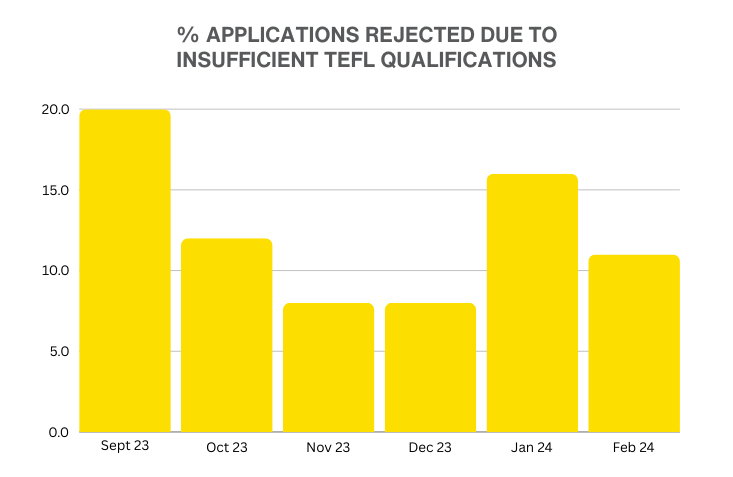Imagine this: you've sent out countless applications for online language teaching jobs, only to be met with radio silence. No acknowledgments, no interviews, not even a rejection email. It's a frustrating experience and often lies with your TEFL certification not meeting job requirements.
Our hiring data shows that an average 12.5% of applicants were rejected due to insufficient TEFL credentials, stopping their online teaching dreams before they could even begin. Your choice of TEFL course matters more than you think. It equips you with the skills needed to teach English as a foreign language.

The problem is currently there isn't an official body for TEFL accreditation. The booming online English teaching landscape has birthed a parallel rise in TEFL course scams, which flood the space with cheap or substandard online courses promising qualifications but falling short when meeting employer standards.
Our 7 TEFL course red flags help you spot and sidestep the fakes. You can sift through the noise and pick one that paves the way for a successful teaching career.
What is a TEFL Certification?
TEFL stands for Teaching English as a Foreign Language. Holding a TEFL certification means you're internationally qualified and equipped with the skills and knowledge to teach English to non-native speakers effectively. It prepares you for the classroom so you're confident from day one.
As the global demand for English teachers grows, most employers require an accredited TEFL certificate to hire you. It signals you invested time formally developing skills to make learning effective and engaging.
Without one, it becomes harder to land jobs at reputable schools and online learning platforms.
Who Regulates TEFL Courses?

There's no global body that oversees TEFL courses. Unlike university degrees with clear standards and oversight, the TEFL industry operates without centralized authority. This means anyone can create and sell a TEFL course. So, knowing what counts as an accredited TEFL course is vitally important.
When you're choosing a TEFL course, you'll want to focus on two main goals:
- Learning how to teach English to non-native speakers effectively.
- Securing a certificate to help you land an ESL job.
Bearing this in mind, let's dive into what makes a TEFL certification stand out.
What Counts as a TEFL Certification?
TEFL certification can seem like a maze. Without a worldwide standard, figuring out what makes a TEFL certificate valuable can be tricky, especially with so many providers in the mix.
According to employers, this is a simple guide to what really matters in a TEFL certificate:
- 120-hour minimum: More than just a number, it's your gateway to online or global teaching jobs. A must-have for work visa requirements in countries like China. It's the baseline that signals you've got the comprehensive training schools are looking for.
- Accreditation: Ensures your TEFL course prepares you for teaching English. Organizations like ACTDEC, IATEFL, OFQUAL, Accreditat and ODLQC only approve programs that make the grade, so you know you're getting quality education and training.
- Practical components: Textbook knowledge alone won't cut it. Employers seek competent teachers from day one. Great TEFL courses offer hands-on practice in real classroom scenarios. From crafting lesson plans to getting constructive feedback, these experiences hone your teaching skills.
- Facilitator or mentor: A qualified instructor to guide your progress is crucial. Their role in reviewing your work and providing feedback ensures your learning is interactive and responsive, not just a one-way street. Schools want to know that you're prepared.
Think of your TEFL certificate as a driver's license for the global classroom. With these elements in your TEFL course, you're all set for a teaching journey respected by employers.

How do I know if my TEFL Course is Legit?
The problem is no single organization is universally recognized as the official accrediting body for TEFL certifications. You'll need to do some research to ensure your TEFL course will open doors for you rather than close them.
Remember, not all certificates are created equal in the eyes of employers and immigration bureaus. A 120-hour TEFL qualification is often the minimum requirement to secure your work visa for:
- China
- South Korea
- Thailand
- Vietnam
- France
And the best part? Once you've got it, your TEFL certification is a lifelong credential that never expires.
7 TEFL Certificate Red Flags:
Warning Signs Your Course Won't Cut It
How do you tell if a course is authentic or a fast track to nowhere? It all starts with knowing what to look for—and what to avoid. Here are the key red flags to watch that your TEFL course isn't quite making the grade:
1) Insufficient Hours: The 120-Hour Rule
The TEFL world sets 120 hours as the standard. It's the number you'll see across ESL job boards, a clear marker of your readiness in the eyes of employers. It's the benchmark that teaching hiring companies, like ours, rely on to gauge the depth of your training.
However, the market is flooded with "intro" or "fast-track" TEFL courses, promising to get you certified in 24 to 100 hours. Sure, they cover the basics, but they won't meet the legal teaching standards set by many countries. Which can leave you back at square one, needing to invest in another course to hit that 120-hour mark.
Short on hours equals short on credibility in your job search. These "beginner" certificates won't impress our hiring managers as they don't meet the legal and quality benchmarks we insist on. Anything less than the 120-hour TEFL course, and you’re likely to be back at the starting line.

2) Unrealistically Fast Completion Claims
Don't get tricked by sites promising TEFL certificates you can breeze through in as little as a few hours. These fast options might seem attractive, but lack the depth needed for effective teaching. We know a rushed certificate when we see one.
A solid 120-hour course should take 8 to 10 weeks, averaging 10 hours weekly. This pace allows you to grasp crucial teaching concepts, including grammar. If you're studying full time — 6 hours a day — you could wrap it up in 20 days, but even that's pushing it.
Skip over courses that:
- Brag about their speed in reviews: While they might fulfill the hour requirement, they leave you unprepared for real classroom challenges.
- Lack of accreditation credentials: No logos from legit accreditors like ACTDEC? That's a red flag. These accreditors verify the course hours and content are as advertised.
- Rely on single-source hype: Don't take one rave review as gospel. Check reviews and accreditations from a few different sources.
Opt for a TEFL that balances time commitment with comprehensive training to ensure you're certified and genuinely ready to teach.
3) The TEFL Course is Free
Recently, we've had several applicants complete a free TEFL course only to find that we don't recognize it. Schools want to know you've done TEFL training that meets industry standards. Unfortunately, these courses lack the depth or accreditation needed to prepare you.
Free courses might offer quizzes but lack evaluations found in paid programs. Legitimate TEFL training involves assessments to ensure you're engaged and learning. We also noticed that they are not accredited.
Free courses don't provide individualized tutor support, so you're alone. It's tough to genuinely gauge readiness when stripped of personalized feedback.
I really liked that the assessment questions weren't all multiple-choice. The final questions really got me reflecting and thinking about how I could improve my teaching.
Bo-An, Online English Teacher
FREE TEFL Courses can be scams
These "free" courses can also sometimes be ESL scams by charging you unexpected, hidden costs like:
- Certificate costs.
- Exam fees.
- Teaching materials.
- Express marking.
Remember, legitimate TEFL jobs often require a hard copy of your certificate and charge extra for the privilege.
Classroom confidence comes from comprehensive, evaluated training, not cookie-cutter credentials. If something seems suspiciously free, tread carefully!
4) No Mentor Guidance? Proceed With Caution
A big red flag in TEFL courses is the absence of experienced instructors actively involved in your training. If no mentor guides your journey, question the course's legitimacy. True learning springs from personalized expert interactions, not just videos and readings.
Evaluate tutors and support structures as you choose a TEFL course. Be skeptical of sites that are vague about who's teaching you. Why? Because having an instructor who's been in the trenches, who's navigated the ups and downs of teaching English, is invaluable.
The absence of a dedicated instructor could signal a gap in the course's ability to fully prepare you for the challenges and rewards of teaching ESL. Mentors are your compass, helping you translate TEFL theory into real-world practice.

5) Accreditation: Don't Get Played by the Name Game
Think of accreditation as your TEFL course's reality check. Accreditation helps separate the reputable from the questionable. It signifies that a recognized third party has assessed and validated the:
- Course content.
- Instructor qualifications.
- Educational practices.
Any training is better than no training. But, without accreditation, you're gambling on the value of your education. Employers check where your certificate comes from as they know who's who in the TEFL world.
When hiring, we always recognize courses accredited by:
Watch Out For:
- Absent accreditations: Avoid courses that lack endorsements from heavyweights like the British Council or ACTDEC. These aren't just decorative; they're your course quality guarantee.
- Fake accreditation: Some TEFL providers scam by creating their own external accreditation when it's the same company behind both.
- Unclear claims: If a course is vague about its accreditations or hides them in fine print, that's a red flag. Transparency is critical in legitimate programs.
- Research required: Google the accrediting body. Is it established and well-recognized? Is it included in lists of TEFL courses? Not credible? Time to bounce.
You want your certificate to open doors, not close them, right? So, choosing a course with recognized accreditation boosts your TEFL education and job prospects.

6) Beware Sparse or Suspicious TEFL Reviews
In the digital age, reviews are the bread and butter of credibility. You shouldn't have difficulty finding them if the course is established and recognized internationally. So, when a TEFL course has zero reviews or feedback, it's a red flag.
Here's the twist, though: affiliate marketing is everywhere in TEFL. You've got individuals and sites promoting courses in exchange for a commission, which can blur the line between honest feedback and paid praise.
- Affiliate overload: It's crucial to sift through reviews for genuine insights, not just glowing endorsements motivated by commissions.
- Silent socials: A TEFL provider's Facebook page without a Reviews section? It might mean they're dodging public scrutiny.
- Deep dive for authenticity: Beyond surface-level testimonials, seek in-depth reviews from past students. Their experiences can offer invaluable insights into the course's impact and value.
- Student insights: Look for candid reviews that discuss the nitty-gritty: the quality of teaching, course materials, and the overall learning vibe.
Before you commit, ensure you've read up on what past learners have to say. A reputable course isn't just known; it's talked about. Make sure you're tuning into the right ones.
7) Post-Course Support: The Missing Piece
Ever bought something, then felt left in the lurch when you needed help? A TEFL course without post-course support is a bit like that. It's the final stretch where some systems drop the ball, leaving you to navigate the teaching world solo.
- Career guidance: If there's silence on job assistance after you've completed the course, that's a concern. You're not just in this to learn; you're here to land a job.
- Mentor MIA: Post-course, a good mentor can be your lifeline. If they vanish after the final quiz, it's a sign the course might be more about transactions than transformations.
- Resource drought: Continued access to teaching resources post-course can be crucial. If a course cuts you off, consider it a red flag.
Before diving in, learn what kind of support they're offering.
Spotting a Legit TEFL Course: Your 6-Point Checklist
- Course content and hours: The gold standard is 120 hours of training. Ensure the curriculum is comprehensive, covering everything from teaching methodologies to grammar and lesson planning.
- Reviews and reputation: Check graduates' thoughts and the course's success rate in placing graduates into teaching positions. A solid track record, ideally over five years, signals reliability.
- Instructor credentials: Your teachers should be seasoned pros with plenty of real-world teaching experience and the qualifications to back it up.
- Practical teaching component: Courses that include actual teaching practice, in-person or online, give you invaluable hands-on experience.
- Post-course support: Extra points for courses offering help or career guidance to smooth your transition into teaching.
- Community insight: Don't underestimate the power of community. Forums and social media groups can be goldmines for unfiltered feedback and tips.
Do your homework, and you'll find a legit TEFL course that prepares you for a rewarding teaching journey.

Final Word
The booming yet unregulated global TEFL industry brings no shortage of scammers hoping to dupe aspiring teachers.
Rather than shortcuts, seek the gold standard. The Really Great Teacher Company offers a fail-safe TEFL course that's 120-hours, is ACTDEC accredited, offers mentored guidance and feedback, and has the benefit of post-qualification online teaching opportunities.
Awareness and due diligence are your allies. So, ask questions. Any good program expects you to do that. The company should be transparent. They want to help you succeed!
